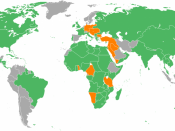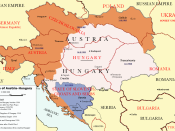Wars are large and complicated affairs. The first word war was the product of many, many things. Although the war officially began on July 28th, 1914, it had been building up for a while. The beginning of the war was much like a domino affect. It started when Austria-Hungary declared war on Serbia. On July 29, Russia ordered a mobilization only against Austria-Hungary in support of Serbia. The Germans threatened war on July 31 if the Russians did not demobilize. France then mobilized. On August 1, Germany declared war on Russia, and two days later, on France. The German invasion of Belgium to attack France, which violated Belgium's official neutrality, prompted Britain to declare war on Germany. World War I had begun. Nationalism, militarism, and imperialism all prompted the rivalry between nations which led to WWI.
Nationalism, the love and support of one's country, has always existed. At this time, however, it was so prominent, it helped cause the first world war.
Since so much pride was devoted to countries, it made the possibilities of peace between past rivals less probable. People felt great loyalty and were willing to do anything for their country. In history, many wars have been over territorial disputes. A country feels nationalistic, and people's pride leads to people wanting to expand with more land. A country can feel so strongly about this, that they will fight for it. The spark of the world was the assassination of the Archduke Francis Ferdinand and his wife. They were shot by a Serbian nationalist because of the crisis in the Balkans. The Balkan Peninsula was a mountainous area below Austira-Hungary and consisted of many different ethnic groups. Each group was very nationalistic and wanted to extend its borders, especially Serbia. Austria-Hungary took over two Balkan Slavic areas. Document...



Well Done
This is a very informative essay of the caused of WWI. Its very good because it views the causes and effects in all the aspects such as military, social, and economic effects.
2 out of 2 people found this comment useful.